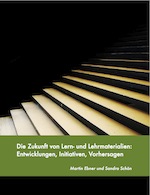Im Rahmen unserer Publikation „Frei zugängliche Bildungsressourcen für die Sekundarstufe – eine Analyse von deutschsprachigen Online-Angeboten und der Entwurf eines „OER-Quality-Index“ auf der heurigen GMW-Tagung stellen wir die Untersuchung von OER-Angeboten für die Sekundarstufe vor. Neben einer detaillierten Analyse wird auch ein OER-Quality-Index abgeleitet, der helfen soll die Angebote besser einordnen zu können. Die entsprechenden Folien wurden bereits hier veröffentlicht.
Zusammenfassung:
Offene Bildungsressourcen, (engl. Open Educational Resources oder kurz OER)finden heutzutage immer mehr Anklang von Seiten der Nutzer/innen, der Anbieter/innen, der Forschungsförderung sowie der Bildungspolitik. Tatsächlich gibt es gibt viele Lehr- und Lernmaterialien für die verschiedensten Schulstufen und Fächer, die auf unterschiedlichsten Webseiten kostenfrei zugänglich sind. Mit dem vorliegenden Beitrag werden die Ergebnisse einer Analyse des Angebots von deutschsprachigen Online-Angeboten für die Sekundarstufe mit einem Schwerpunkt auf österreichische Anbieter vorgestellt. Ein wesentliches Ergebnis ist dabei, dass es sich mehrheitlich nicht um tatsächlich „offene“ Bildungsressourcen handelt, da die rechtlichen Rahmenbedingungen (z.B. Verwendung eines entsprechenden Lizenzmodells) nicht gegeben sind. Neben einem Kriterienkatalog zur Analyse des Angebots wird ein daraus abgeleiteter „OER Quality Index“ vorgestellt und entsprechende Ergebnisse einer detaillierten Analyse von 46O Online-Angeboten präsentiert
Zitation: Rossegger, B., Ebner, M., Schön, S. (2012). Frei zugängliche Bildungsressourcen für die Sekundarstufe – eine Analyse von deutschsprachigen Online-Angeboten und der Entwurf eines „OER-Quality-Index“. In: Digitale Medien – Werkzeuge für exzellente Forschung und Lehre. Csanyi, G., Reichl, F., Steiner, A. (Hrsg.). Waxmann Verlag GmbH, Münster. 41-57

